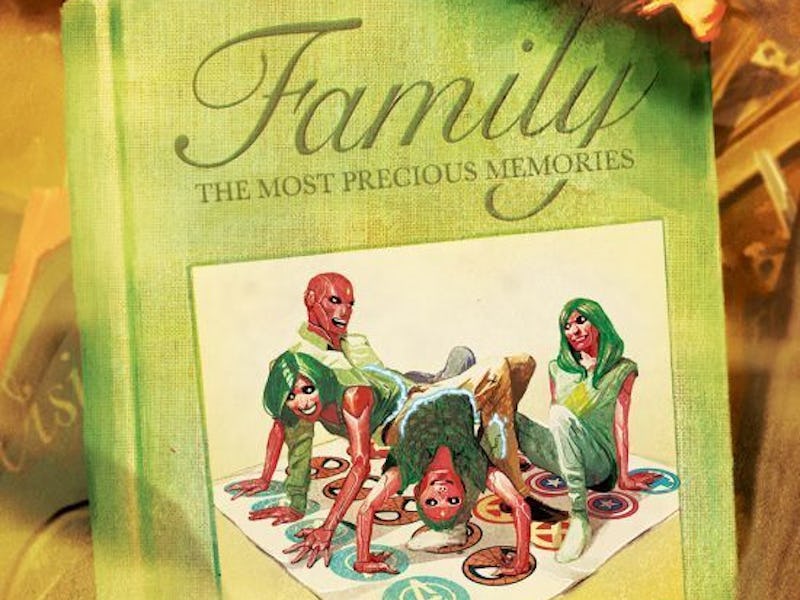R.I.P. 'The Vision,' Marvel's Best Comic Book of 2016

After 12 issues, the best superhero comic of the year has come to a close. Tom King’s The Vision has been routinely praised by critics for its smart, insightful, and deeply human take on the Marvel Universe’s most famous A.I. robot. As one of the smartest, saddest books of the year, there’s plenty of reasons why you should take the time to visit Marvel’s most ambitious story, if you haven’t already.
Vision Realized
Vision is a bit of a mystery, even within the Marvel Universe. Despite being around since the early ‘40s, attempts to humanize the character have often fallen short. The best early attempt was John Byrne’s 1989 “Vision Quest” storyline in West Coast Avengers, where Vision’s machine aspects were given priority over his human traits. The story essentially dismantled Vision’s marriage to the Scarlet Witch and revealed that their twin sons were nothing but imaginary constructs.
Tom King takes influence from Byrne’s story into his own Vision comic, before completely taking the series to a new level. There is no pretense of humanity when the Visions are introduced in issue one. However, through 12 issues, King charts a path in which a family, fully aware of their artificial lives, discover humanity through the pain and suffering that comes with living “normal lives.”
Everything was normal
A.I. Deconstructed
The Vision family are painfully aware of their robotic nature, and where you expect them to rebel against this fate, they instead resign themselves to it.
They understand their robotic nature, but they each feel confused when they’re confronted by the human situations their seemingly normal lives keep getting dragged into. After a series of painful events, Vision and his family are driven from their original plans, and the series ends with Vision and his family no longer wanting to truly be human, despite being more vulnerable than they were at the start of the series.
Anti-American Beauty
What’s great about Tom King’s story is how it avoids the trap of viewing suburban domestic life as a kind of prison. A home in the suburbs was never anything to the Visions other than a simple location. Their humanity, or at least attempts at being human, came from playing “suburban family” as a sort of experimental game.
It’s also unclear at first exactly how the Vision feels about the family he built for himself: His wife, his son, and his daughter are all his inventions, after all, and at first it seemed like they were just shallow attempts to pass off as a normal human.
This disconnect makes their encounters with human situations like anger, sadness, love, and sexual intimacy all the more jarring. These symptoms of humanity ends up causing the Visions to realize that they care less about being human than they do about being a family.
No, it does not bother me.
By the end of the series, when the family of four has been reduced to two, Vision has never appeared more well-rendered. Tom King has reinvented Vision from a non-feeling hopeful-human into a deeply tragic character. Vision’s conflicted nature is a fascinating study in what it must be like to live in the Marvel Universe, full of its superpowers, aliens, and advanced technology.
By putting Marvel’s most confusing semi-magic, semi-futuristic character in the suburbs outside Washington, D.C., King managed to write one of the most tragic, heartwrenching stories in contemporary Marvel canon.
The Vision #12 is currently available in comic book stores and digital retailers.